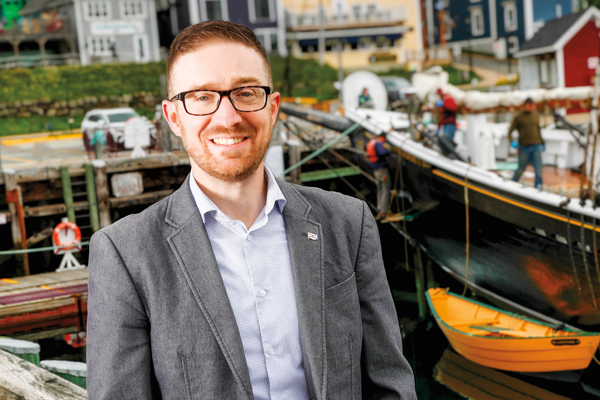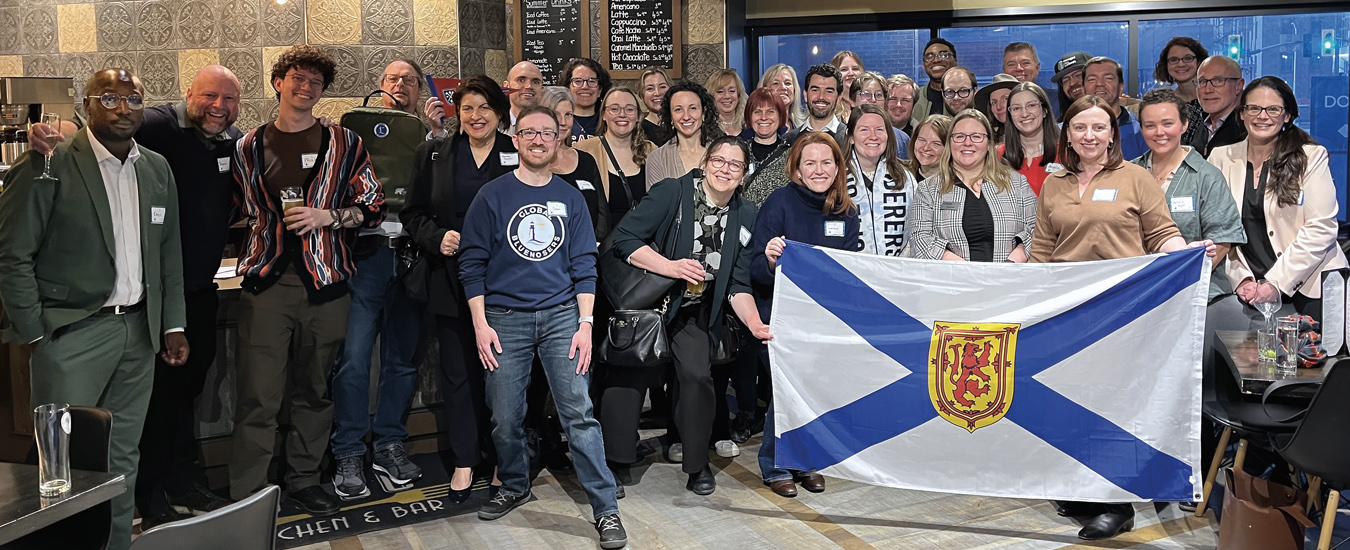When Sean Meister launched the Global Bluenosers podcast from his Halifax home in April 2023, he had no grand business plan, no financial backing, and no formal mandate. What he had was a hunch, and a deep, personal sense of urgency.
“I was out there desperately seeking other Nova Scotians,” he recalls of his decade away from the province, split between Alberta and Ontario. “What I saw were people who’d been gone 30 years and still called this place home. It sat in my head as an untapped opportunity.”
That opportunity has since taken on a life of its own. Global Bluenosers is now a federally registered nonprofit, with members from London to Dubai and events in cities across North America and Europe. The mission: Bring Nova Scotians, by birth or by choice, together wherever they are in the world. Not to convince them to return, but to help them stay connected, build new community where they are living, and generate professional opportunities, based on shared identity and values.
“The mistake we’ve made as a province,” says Meister, a New Ross native and former trade official with Nova Scotia Business Inc., “is looking at the diaspora as something to bring back. It’s always been the wrong focus. It’s not about when you’re moving home. It’s about building a sense of belonging wherever they are.”
That distinction, between nostalgia and activation, between sentiment and strategy, is where Meister is staking new ground in diaspora engagement. His argument is clear: Nova Scotia’s far-flung sons and daughters represent more than cultural memory. They are a powerful, largely untapped economic and diplomatic force.
He’s not the only one who thinks so.
“I always say, some of my favourite people in the world tend to be people with big city disposition and small-town values,” says Dave Culligan, a Halifax-based video producer who’s attended Global Bluenosers’ events in London, San Francisco, and Toronto. “You’ve got these people rooted in communal values, like taking care of your neighbours and treating everyone with kindness. But they’re also CEOs, entrepreneurs, creatives — people trying to make their businesses work.”
Culligan, who has sponsored multiple Global Bluenosers events, sees more than just warm reunions. “The quality of interaction is so much higher,” he says. “I could go to a thousand-person marketing conference in New York and come home with nothing. But in a room of 60 Bluenosers, I leave with 20 real friends, people who’ll go out of their way to help.”

From its early days as a podcast, Meister’s initiative has evolved into a multi-city event series, with gatherings in Dallas, Frankfurt, Toronto, Calgary, and twice in London, and a growing network of professionals who see the group as both social lifeline and business incubator. “We started with storytelling,” he says of the podcast. “That quickly evolved under its own momentum into in-person events around the world. A few weeks ago, I decided to go full time. The goal now is community plus impact.”
That impact comes in many forms, from dinners and trade leads to embassy speaking gigs. Joanna Davies, an aerospace and defence expert in Ottawa met the group at a London event. “From that event,” she says, “I was connected to the Canadian Trade Commissioner in Copenhagen, and I was invited to speak at the embassy of Canada. All because of Global Bluenosers.”
Connecting people in less obvious ways creates the strongest networks. “I reconnected with someone I hadn’t seen since high school, 40 years ago,” she adds. “It’s all based on our love for the province.”
That emotional connection is precisely what gives the group its strategic value. “Everywhere I go,” Meister says, “people ask: ‘How can I help?’ They want to contribute, whether it’s mentoring, investing, or opening doors. Our job is to provide them with a conduit to do that on their own terms.”
The message resonates across generations.
“I thought I’d only been here 10 years,” says Olivia McDonald, a Fall River native who’s been living and working in London since her early 20s. “Turns out it’s been 11 years. And the more time passes, the more pride I feel about where I’m from. I couldn’t wait to leave (Nova Scotia), but now I really appreciate the values we grew up with.”
McDonald, who works in digital marketing for a cybersecurity firm, says the gatherings are more than nostalgia. “You’re in a big city where culture can be quite reserved. Then you get in a room with other Nova Scotians, and the kindness just comes out. Friendships form. Business partnerships too. But it’s genuine.”
Nick Scrymgeour, a tech recruiter from Lower Sackville now living in Toronto, agrees. “You’re not from here,” people tell him. “You’re too easygoing.”
He laughs. “I guess I owe that to being a Maritimer.”
Scrymgeour first met Meister years ago while promoting near-shore recruitment opportunities in Halifax for Ontario-based clients. “Back then,” he says, “it was a side hustle (for Sean). Now it’s a full-on organization. And the value is clear — advocacy, business opportunity, mentorship. Sean is building something that the province has needed for a long time.”
That value becomes clearer when viewed in the wider context of global migration. Canada has a large diaspora, with more than four million citizens currently living abroad. According to Global Affairs Canada, major concentrations exist in the U.S. (nearly 1,000,000), the United Kingdom (90,000), and Hong Kong (approximately 300,000), with growing populations in France, Australia, and the Middle East.
Nova Scotia’s share of that diaspora is harder to quantify. No federal agency tracks provincial out-migration in global terms. Still, Meister insists that the real power lies in the diaspora itself. “Nobody has the data,” he says, “but it’s looking at about like 250,000 to 300,000 people globally that would … fall within that category of being the Nova Scotian diaspora.” Many are concentrated in cities like Toronto, Calgary, London, and Dubai, forming organic clusters of identity and opportunity that Global Bluenosers is now actively working to connect.
And connection matters more than ever. With renewed global instability, from trade tariffs to political volatility, expatriate Canadians are stepping up in unprecedented numbers, whether through political engagement, grassroots advocacy, or community-led networks like Global Bluenosers.
“Of course, everyone’s back was up,” says McDonald. “It’s just outlandish. But I can tell you that Canadians here (in the U.K.) are rallying. People are buying Canadian, supporting Nova Scotia products, writing their MPs. It’s that feeling of responsibility to stand up and protect what people have worked so hard to build.”
Meister says the current climate has only reinforced Global Bluenosers’ relevance.
“This isn’t a nostalgia project,” he says. “It’s a long-term legacy. It’s about rethinking who we are and how we see our place in the world.”
In other words, it’s not about coming home. It’s about bringing home with you, and building something bigger wherever you are.
